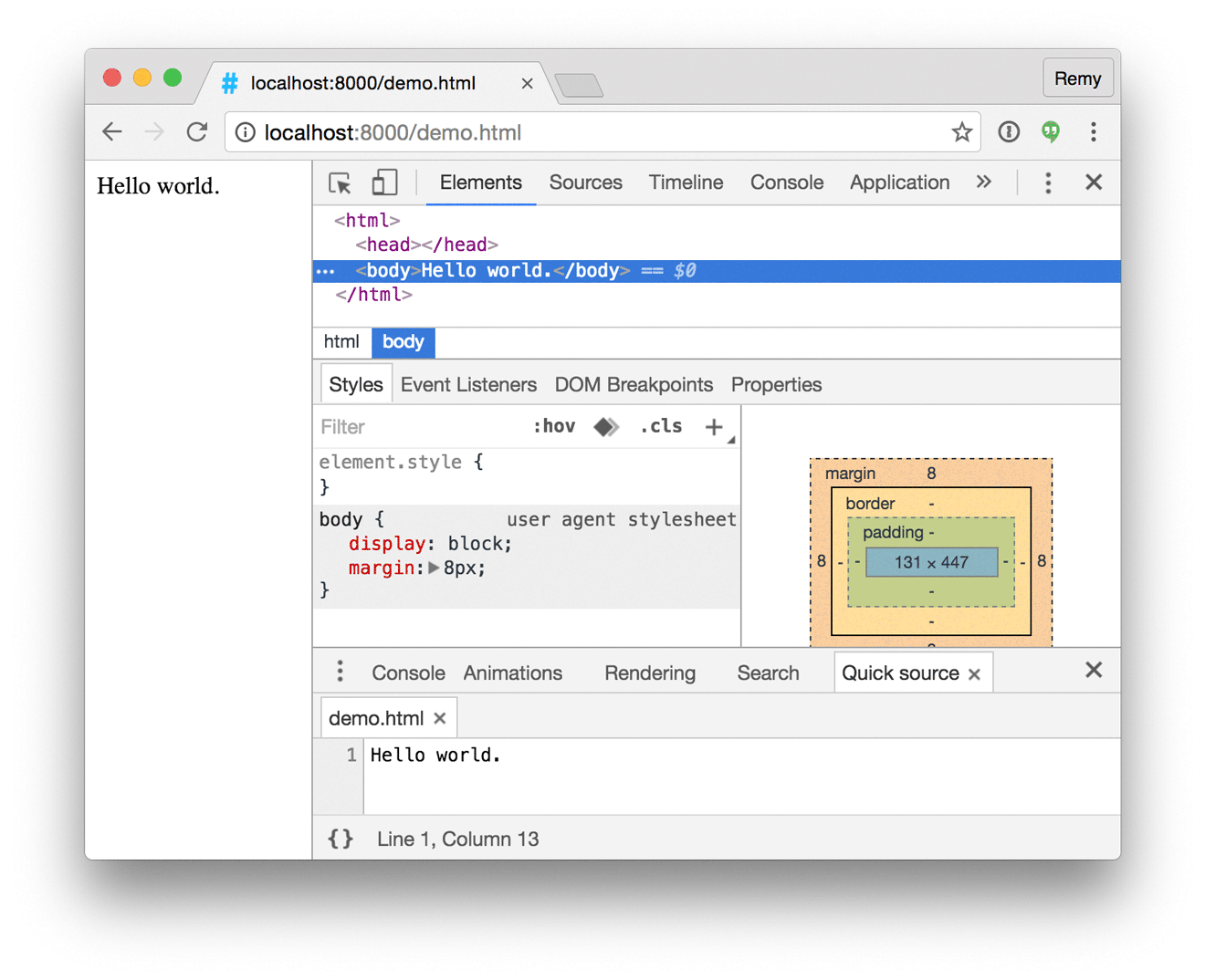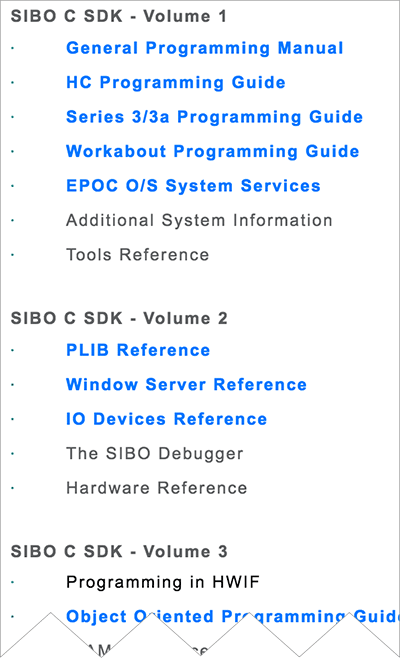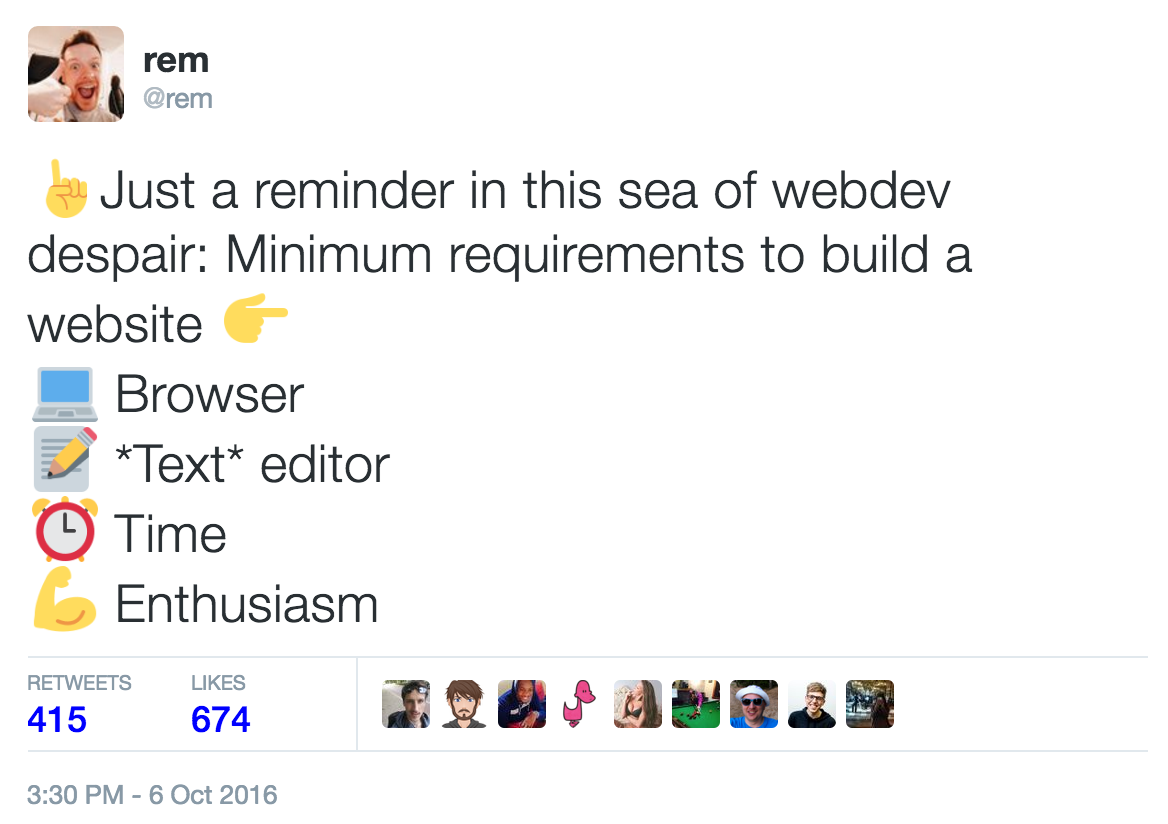Living Standard: part 1
I work pretty much all day on the web. I use it for research, I use it to socially, I use it professionally, I use it when I'm bored, or need inspiration. I'm constantly impressed by what I see on the web.
Here's the winner of the 13K JavaScript games competition this year. No plugins. No complilers. Just browser code. WebGL in particular. If I didn't know better, I'd think this screen was from a console or PC game, let alone 13K of compressed code 😱
The web constantly amazes me. It constantly freely gives me access to information and ideas. It constantly challenges me. It constantly makes me laugh. The web, feels infinite. All this content and software, put out by ordinary people. Ordinary people just wanting to share their experiences.
I am humbled by the web.
I'm a tinkerer. I need to be creative to keep myself happy. Computers are my tool, but the web is my distribution platform. I pay very little to contribute, and when I was younger (and not earning money), I was able to share freely on web sites like Geocities and Anglefire: essentially free hosting and precursors to sites like Myspace.
Under all the complexity of today's modern technology, and modern libraries and frameworks, the web, and programming for browsers is still small, simple and forgiving.
Browsers are tremendously clever. They can read simple text, and if you give the filename an extension of .html, the browser does a whole load of extra work for you:

Combined with the open source movement that has grown in momentum over the last decade, there's an enormous amount of free support ranging from small libraries maintained by individuals, to larger projects like Dojo, jQuery, React, Angular and more that are supported by teams and a huge number of community members. And all for free?
I don't have to use their code, but due to the nature of view source in the browsers (and also open source), I can read through the code that makes "things work" and learn from it.
Me, personally, I was writing a flavour of JavaScript back in 1998 (Windows Shell Scripting), and I never picked up a book on the topic and I continued to write JavaScript in dribs and drabs for a few more years. It was when jQuery came along in 2006 that I took some time to read through parts of the code (and eventually got to know all of the code base).
jQuery's source code taught me a great deal about code design and how JavaScript really worked. The source code also pointed to online articles that helped to inform design decisions, and from the there I would learn even more (and mostly from Dean Edwards' website).
Nothing has changed this fundamental aspect of both browsers and the web. Yes, creating web sites can be a lot more advanced, but the truly awesome nature of the web, and its possibilities, has always been there.
That's why I still believe in the web.
Creative outlet
Computers, for me and many others, is a way to express creativity. At it's peak, I never understood myspace.com. I was naïve. I didn't realise the importance of creativity in learning (even though I used this skill all the time myself).
I was extremely lucky to have a parent working in technology from an early point in time. We had a ZX Spectrum in our household from the early 80s. I remember trying to copy out reams of code from a magazine into the Spectrum. Taking me hours and hours and hours, only to be presented with something like Q Parameter error. Literally IDK ¯\_(ツ)_/¯.
During the early 90s, my dad had bought a Psion 3. It was an early Personal Digital Assistant - sort of like a really small laptop with a monochrome LCD display - but what interested me most was that there was a public Software Development Kit (SDK) available. The potential to create my own application.
I'd already dabbled in writing my own applications using Visual Basic, but really the BASIC part of VB allowed me to wire up UI components to actions. If I wanted to do something more interesting, or produce an application that wasn't 4mb (which would have to span over 5 or 6 720K floppy disks!), I would have to learn Visual C++, which for the 13 year old me just wasn't going to happen.
The Psion was significantly more simple than a PC (and the related VC++ libraries), so I figured I should be able to learn just enough to make my own Psion application.
I found the FTP address of the SDK, and started to download the zip file over my 14K modem…which, suffice to say, was a very long and expensive phone call.
When the SDK was finally down, I was presented with lots of interesting directories, and .c and .h files, and PDFs with lots and lots of documentation.

However, there was no spring board directly in. I had to first learn about compiling, then linking, and memory, and pointers and stuff and more stuff and (╯°□°)╯︵ ┻━┻. So, sadly, the 13 year old me aborted after that long wait, and never actually wrote anything for the Psion.
SDKs require time and experience and the ability to gain knowledge. Of course, when the Psion eventually died out (and I suspect many of you haven't even heard of the Psion), the knowledge of the SDK is completely useless.
One of my favourite aspects of developing for a browser is the simplicity and little knowledge you need to make something. It's easy to be disparaging about the tools required today to make a website, but it's also worth remembering that it can still be simple, and in my opinion, newcomers should start simple too.

To allow more people to use the web as a platform to share their creativity, we need to remind ourselves that it can be simple. We need to remind ourselves that although we complicate the process with tooling and fine tuning, it can still be fun if we set aside the rig-amoral .
Access to the same doorway
The web allows me to share my work with friends, strangers, a handful of people or hundreds of thousands of people. I have the same opportunities and potential for reach as a multi-million dollar company.
Before the web was accessible in every home and a great deal of pockets, access to knowledge, ideas and creativity was limited. Usually limited to where you lived. Some of that still exists today. It really annoys me when there's a US release of a film that's either released locally months later or potentially not at all.
In these cases the distributors have control.
Where there are distributors for the web: we lose. Facebook is mostly a walled garden. To play, you must give up certain freedoms, like who can see what you share, or what information you have to share.
The open web is different. It's open. Unlimited. Unmetered. Unchecked. For better or worse.
Drafts may be incomplete or entirely abandoned, so please forgive me. If you find an issue with a draft, or would like to see me write about something specifically, please try raising an issue.